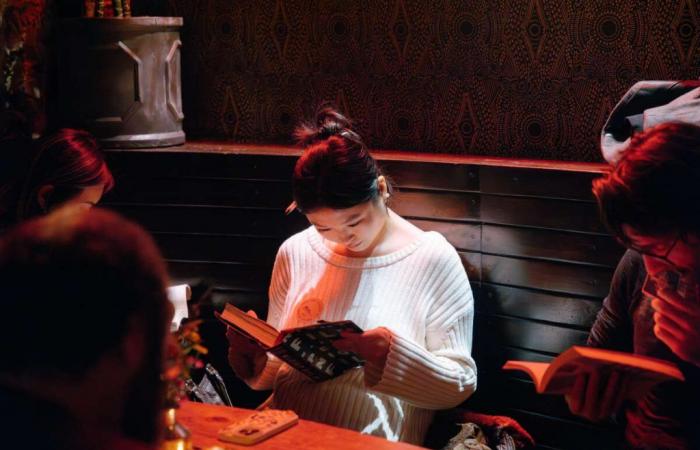In parks and cafes, more and more twenty-something bibliophiles meet to discuss their readings. And find in these meetings a new source of social bond.

Reading, an act considered solitary, is shared with pride in book clubs. Reading Rhythms
By Emmanuelle Dasque
Published on September 29, 2024 at 4:00 p.m.
UOnce a month, on a Tuesday evening, Jeremy Pearson, 25, meets a small circle of readers at the Harlequin, a pub with a garden in the Angel district of London. On the program: Shakespeare, Steinbeck or Salman Rushdie, and a few beers. “We discuss selected works together, which we have read at home. It can be fiction, drama or poetry. It’s a suspended moment, far from the notifications of our phones and constant requests. A real break around a book that connects us. » At the other end of the city, the London Girls Book Club very often organizes literary meetings – an evening in a bar, a meeting in a café or a walk in the fresh air – where around fifty young women discuss a theme through a chosen book. “Tickets sold online – between 5 and 15 pounds – are snapped up in less than fifteen minutes,” says Caitlin Curry, the founder. Last June, several Londoners in their twenties even organized a giant picnic on the lawns of St James’s Park, to exchange books (« book swap ») and celebrate their common passion for « book club », become, in recent times, their favorite refuge.
According to the site Event Brite, the number of people registered for these meetings increased by 41% in the United Kingdom between 2022 and 2023, with a significant participation of members from Generation Z [née entre 1997 et 2012, ndlr]. These young people would also have become frequent visitors to local bookstores – book sales among 14-25 year olds accounted for 61 million copies, or 18% of the market in 2022 –, according to a series of studies carried out by the Institute of research Nielsen Book Data. In short, if these figures are to be believed, books would be one of the new passions of this generation, to whom we usually attribute many hours spent on screens rather than long evenings reading.


The London Girls Book Club brings together around fifty young women, who meet to discuss a theme through a chosen book. @morpetharms
Is a part of Gen Z inventing, with its own codes, a new literary universe? “These book clubs are a natural extension of the BookTok and Bookstagram that exist online,” recalls Hana Owens, 25 years old and co-founder with Emily D’Souza and Josh Pullinger of the very recent bibliophile community It’s Hard Back out Here (“it’s not easy around here”), born virtually before meeting once or twice per month in Soho. “Most of the people who come to our meetings were first interested in literature via these accounts which recommend books, with short videos and very personal productions. » With some 200 billion views, #booktok was the network’s most popular hashtag in 2023, while the online book clubs of celebrities such as Dua Lipa (Service95) or Kaia Gerber (Library Science) between them bring together nearly 500 000 followers on Instagram.
Also read:
“Booktubes”, “Bookstagram”… literary critics, these new influencers
A phenomenon born online, which ended up giving birth to new communities in real life. Reading, once considered a solitary act that one did not dare to admit for fear of appearing like a stuck-up “intellectual”, is today shared with pride. It has even become the nerve of a new sociability, to the point of bringing up to date a tradition dating back to the 18th century, when, in English salons, stories were read and commented on aloud. An entire youth group now meets in bars, cafes or parks to discuss the latest bestseller spotted on the networks (Sally Rooney, Dolly Alderton, etc.), debate major existential themes (friendship, breakups, etc.) or literary genres (black novel, fantasy, etc.). Entities where we feel perhaps and above all belonging to a community in real life (and not just online), in the hope of reconnecting with others.


The It’s Hardback Out Here community was born online, and now meets once or twice a month in Soho. Photo Nicolas Freitas
“The book is in reality a medium here to create a link, analyzes the anthropologist Élisabeth Soulié, who has been studying this generation for years (1). Gen Z defines itself as a tribe because it was constructed this way through the web of networks. Here she recreates this pattern and this very “clique” way of life with book clubs, where we live in a new time, subjective, intuitive and focused on the present moment. » Hana Owens readily admits: behind the desire to launch It’s Hard Back Out There with her two friends, there was, beyond a real passion for reading, a deep desire to belong to a community that makes sense. “That’s what our club title means, implying “it’s not easy in real life!”. We wanted to find young people our age with a hobby similar to ours, and reading is an easily unifying element. We can quickly start a conversation, share emotions. We know very quickly if a person belongs to the same clan as us. »
It is completely sterile to contrast the two universes and imagine that the screens would signify the end of the book.
Dorothee Birke, professor of English literature
Like other very “niche” clubs (on the environment, LGBT or a specific literary genre), Caitlin has chosen to create an exclusively female club, where participants only read women or related authors. to the feminine gender. “It has become our third space, after home and our workplace, she confidesa comfort zone where we exchange freely. An antidote also to a certain loneliness, which we can feel in big cities or in front of a screen. »
Next October, around thirty members of the London Girls Book Club, which has around a thousand members, are going on a trip to Morocco with, as an alibi, the joint reading of a few books. “We are saturating screens. We need to reconquer a social space in reality,” continues Hana, while Jeremy mentions “a real pleasure to reconnect with a slower relationship with time, where we take care to settle down and listen to ourselves”. In the end, this generation, which we sometimes have difficulty understanding and which we often present as hyper-connected, “tinkering with hybrid spaces”, to use the expression of Élisabeth Soulié. These young adults play on several tables, in a subtle back and forth between the virtual and the real.


Book clubs are also experiencing a revival in New York, for example with Reading Rhythms reading evenings. Reading Rhythms
For Dorothee Birke, professor of English literature who works on digital cultures at the University of Innsbruck, “it is completely sterile to oppose the two universes and to imagine that the screens would signify the end of the book. In fact, the opposite is happening here. It is precisely because we live in a new digital era that the book can become this sacred object with such an aura.” In New York – another realm of the revival of book club, where reading evenings (« reading parties ») are the festive places of the moment – there are regularly around a hundred of them meeting in cafes, on terraces or in the heart of Times Square. Sitting next to each other, a book in their hands. Everyone reading their own story, with the desire to weave a common story.






